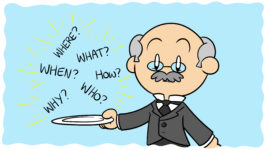Reader, I have a confession to make: I like Jonathan Franzen.
I know, I know, but look – put down your pitchforks, call off the hounds of Twitter, let’s talk about this. I know it’s popular to hate on Franzen. I know that, ever since he thought The Corrections was too good for Oprah’s Book Club (which, I mean, it was), the consensus has been that Franzen’s a wealthy, elitist, privileged pig who should stick to birdwatching.
Now, this has some truth to it. He is certainly wealthy; he’s also absolutely a literary snob; he does love his birdwatching; and, yes, he’s definitely more privileged than a lot of writers out there, so some of his more self-pitying observations have understandably riled people up (‘When information becomes free and universally accessible, voluminous research for a novel is devalued along with it.’ – oh, boohoo pal).
But! I, as a fellow lit snob, see his snobbery less as a contemptuous disregard for genre fiction (his own fiction, after all, is nowhere near as academic, dense, or self-regarding as his Twitter infamy might suggest, and is not without its own marketable sheen – Ulysses this ain’t) and more as a symptom of his genuine love for literature and desire for it to thrive, develop and be respected. His main complaint regarding the literary scene, far from reactionary elitism, seems to be that the good stuff is getting ignored by publishers in favor of the easily marketed: as he says in How to Be Alone, ‘the dollar is now the yardstick of cultural authority.’
Yes, this feels rather quaint and old-fashioned, and Franzen certainly hasn’t helped himself by casually denigrating less successful authors for such crimes as ‘shameless self-promotion,’ but y’know what? His cause is just, even if he sometimes does it more harm than good.
Of course, I wouldn’t be trying to defend Franzen in the first place if he wasn’t a good writer. Thankfully, he is: The Corrections and Freedom were two of my first contemporary American novels, and I think they’re just swell. The critical establishment agrees: Franzen won a National Book Award for The Corrections, was shortlisted for the Pulitzer, and in 2010 he appeared on the cover of Time above the heading ‘Great American Novelist.’
Like just about every other successful writer out there, Franzen has shared some writing advice. Unlike almost every other successful writer out there, he was widely mocked for it. Well, I think there’s value enough in his words for it to be worth deconstructing some of his pithy lessons, so let’s dive right in.
‘The reader is a friend, not an adversary, not a spectator’
Starting off strong; this tip, if followed, should shape how you write, how you structure your plot, and help you avoid investing too much ego in your writing. Franzen and writers of his generation (I’m thinking particularly of his white, postmodernity-obsessed contemporaries David Foster Wallace, George Saunders, and Jennifer Egan), spellbound by the dense, clever-for-the-sake-of-clever work of their forebears (William Gaddis, Thomas Pynchon, etc.), have certainly been guilty of ‘showing off’ in their earlier work, and Wallace in particular was very vocal about the struggle of separating writing from ego.
Franzen, by insisting that the reader is a friend, not a spectator, warns against this kind of overly clever showboating; yes, you could bury allusions to Dante’s The Divine Comedy throughout your political thriller; yes, you could write using only devilishly considered puns that work across several dead languages; and, yes, you could force the reader to closely read Antonio Benitez-Rojo’s The Repeating Island to understand your story’s ingenious interlinking and repeating timelines – but, at the end of the day, why? Who is it for?
Franzen, having endured these urges, came to the truth the hard way. Most of the time, this kind of literary flexing isn’t for the reader any more than it’s for your fiction; it’s for you. Feeling clever is all well and good, but not when it asks your reader to play the onlooker.
But the tip goes further; just as you shouldn’t be constantly trying to dazzle your readers with your whip-smart wit at the expense of the quality of your communication, you shouldn’t be bullying or ignoring them either.
You’ve probably read fiction that treats you like some kind of invader or opponent. Such writing leaves no space for reader engagement or interpretation: it tells you exactly what’s going on, whether that event is good or bad, whether the characters involved are noble or selfish, and exactly what you should think and feel about the whole situation, starting from the assumption that you don’t understand or are primed to disagree. It makes for closed-off and unengaging writing that, just as much as literary showboating, pushes the reader away.
Perhaps a good final aphorism: if you catch yourself writing something in your fiction that you’d be embarrassed to say to a friend, reconsider.
‘Write in the third person unless a really distinctive first-person voice offers itself irresistibly’
Jonathan, come on now, it’s pointers like this that make the Twitterati roll their eyes. But, again, I see where Franzen is coming from here, even if it is a rather conservative piece of advice. Indeed, look back over the American canon and you’ll find comparatively few books with first-person narrators, and those there are still tend toward really distinctive narrators (Nabokov’s Lolita, not by an American author but a very American book, is famous for Humbert Humbert; Edgar Allan Poe is famous for many of his short stories’ insane first-person narrators; and, more recently, Karen Russell’s dreamlike Swamplandia! has pulled off a compelling first-person narrator, as has Emma Cline’s The Girls).
But this is still rather old-fashioned advice, and it’s also genre-specific. It’s doubtful Franzen knows anything, for instance, about writing good YA or horror fiction, so writers of such genres would do well to ignore this one. But, if you reckon yourself a budding writer of great social novels, pay attention.
The great benefit of third-person limited narration is that it allows far more flexibility. If you want to zoom out and show your characters in the cold, harsh light of day, you can; if you want to employ some free indirect style and momentarily narrate using your focal character’s voice, you can do that too. Dramatic irony becomes possible; scope becomes easier to control. This makes it ideal for the kind of fiction Franzen is writing: humanistic social novels that encompass multiple main characters moving within carefully considered social institutions and time periods. It’s easy to see why assuming it as a default style might be beneficial to some authors.
‘You see more sitting still than chasing after’
An aphorism for the Goodreads’ quotations page if ever there was one. As with the ‘reader-is-your-friend’ tip, this one warrants breaking down.
Firstly, it’s about the writing process: curb your want. If you’re focusing on the outcome rather than the work itself, your work will suffer. This is a facet of Franzen’s anti-economy perspective that so enraged literary Twitter users, who pointed out that sometimes things need to get finished so you can actually pay the rent.
That’s both important and true, but it doesn’t take away from Franzen’s point: given the luxury of time, your work will improve.
This line also flies in the face of advice from writers such as Ernest Hemingway and Cormac McCarthy, who suggest that good fiction comes from living an interesting life and doing interesting things. No, says Franzen, get back to your desks! In fact, in another writing tip defying these macho masters, he goes so far as to say that the ‘most purely autobiographical fiction requires [the most] pure invention.’ Or, failing that, go on a nice relaxing walk. Think. Slow down, let your ideas brew, your imagination work, and don’t panic. It’ll all become clear.
‘It’s doubtful that anyone with an internet connection at his workplace is writing good fiction’
Okay, so Franzen doesn’t always make his defense easy. But come now, contemptuous phrasing aside, Franzen’s hardly the first writer to warn against the dangers of the internet and modern information tech more generally. Zadie Smith refuses to even touch a smartphone, for heaven’s sake!
This is, again, a rather genre-bound tip, in that, if you’re writing fiction that requires considerable research – legal fiction, for example, or historical fiction, or particularly scientific sci-fi – the searchable encyclopedia that is the internet will likely come in useful. William Gibson, inventor of the cyberpunk sub-genre, famously said he keeps Firefox open alongside Microsoft Word when writing.
That said, if you’re writing character-driven literary fiction, YA, or indeed anything that doesn’t rely on easy access to information, the internet will likely be more of a curse than it is a boon. Even if you’re someone who’s able to resist the addictive-by-design feeds of Facebook and Twitter and Instagram and the rest, the fact that the internet allows you to quickly check spellings and grammar rules is an invitation to slow your writing process with needlessly precise, in-the-moment editing. And oh, what’s this, a blog post on writing good action scenes? A word processor that’ll make my writing more like Hemingway’s? And, goodness me, what’s Stephen King been tweeting now?
You get the picture. Sometimes it’s best to cut yourself off, get in the zone, and actually get words on the page. You can edit/proofread, fact-check, and catch up with Stephen King later on.
An author’s personal adventure
Franzen has offered other writing tips (some of which aren’t really tips at all), but those are either less interesting, less defensible, or go beyond the scope of this article. It bears saying: yes, sometimes the guy is just wrong.
Still, I hope this has been enough to convince you that, whether you like the man or not, Jonathan Franzen’s books are indeed worth reading and (some of) his advice is worth paying attention to.
So, next time you’re assessing a project, ask yourself whether you’ve kept your ego in check, whether you’ve done enough to engage your readers, whether your chosen narrative voice is really the best one for your book, and whether you really need the wi-fi on for this session.
Which is your favorite of Jonathan Franzen’s books? What lessons did you personally glean from his work? Let me know in the comments, and check out 7 Ways Kazuo Ishiguro Can Help You Improve Your Writing and 6 Ways Salman Rushdie Can Improve Your Writing for some (possibly) less controversial literary advice.





